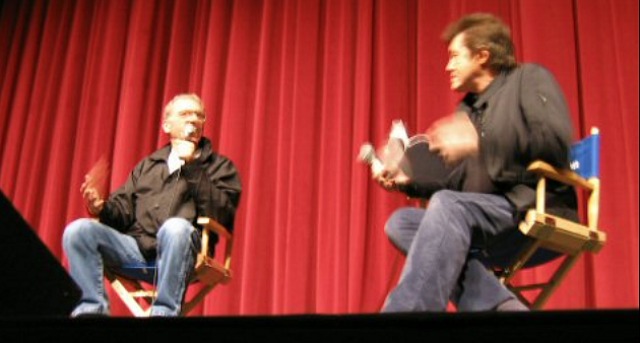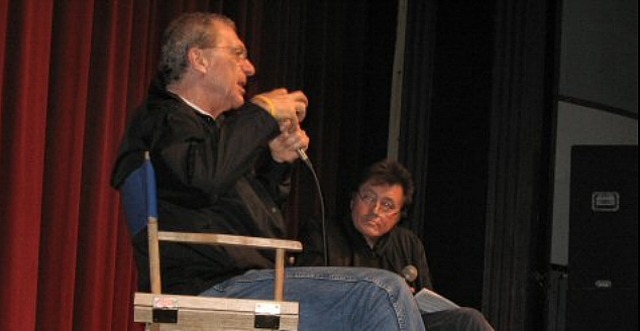Sydney Pollack passed just over a decade ago. He came to mind a few hours ago when an HE commenter dismissed Pollack’s The Interpreter (’05) as “lame’ and “out of touch.” I reminded that The Interpreter has a bomb-in-a bus sequence that’s fairly brilliant. Otherwise it’s an above-average, reasonably engaging drama of its type. (Consider this Desson Thomson review.) Not a perfect film, but an above-average, reasonably decent one.
Pollack made a lot of films that fell under this category, but I’ve know very few filmmakers who worked harder at getting it right. Each and every time he really sweated bullets.
From my Pollack obit: “If you had told me 18 months ago that Pollack and Anthony Minghella, partners in Mirage Enterprises who worked together on The English Patient, Cold Mountain, The Quiet American and several other quality films…if you had told me then that both of these guys would be lights-out by May 2008, I would’ve said “what…?” Both of them were too active and alive. They had too much talent and know-how, too many miles to go.
People always bring up Out of Africa (’85) and Tootsie (’82), the hugely successful comedy with Dustin Hoffman as a straight cross-dressing actor, as Pollack’s finest, best-known films. They’re both solid and accomplished (Tootsie especially), but the Pollack pics that I’ve most enjoyed are the genre thrillers — Three Days of the Condor, particularly, and The Firm — because they exceed their boundaries and then some. They’re about Pollack adding shrewd and surprising things rather than just meeting expectations.
Both have melancholy emotional currents — feelings of loss and regret — and some graceful resignations, courtesy of the wry and understated dialogue by David Rayfiel, Pollack’s pinch-hit rewrite guy for decades. Plus they’re both driven by character as much as plot.
Gene Hackman‘s confession to Jeanne Tripplehorn in The Firm that he plays around “because my wife understands me.” (Too well, he meant.) European Condor assassin Max Von Sydow working with miniature models in his New York hotel room. Condor CIA guy Cliff Robertson asking his superior, played by John Houseman, if he misses the “action” he encountered during the World War II years, and Houseman responding, “No, I miss that kind of clarity.” Both films teem with this kind of stuff.
After these my favorites are (a) Sketches of Frank Gehry (Pollack’s wise, affectionate, layman-level appreciation of our greatest architect), (b) Jeremiah Johnson, (c) the final voice-over moment in Havana, (d) the first half of Random Hearts, (e) all of The Yakuza, They Shoot Horses, Don’t They? and Castle Keep, (f) the bomb-on-the-bus scene in The Interpreter and (g) portions of The Way We Were, particularly the final scene.
And, of course, there were Sydney’s first-rate performances — the divorcee in Husbands and Wives, that red-felt pool table scene with Tom Cruise in Eyes Wide Shut, a pair of cynical and corroded seen-it-alls in Changing Lanes and Michael Clayton.


The last contact I had with Pollack was four or five months ago, sometime around Christmas. I e-mailed him and asked if he’d seen 4 Months, 3 Weeks & 2 Days. When he said no I asked him if he wanted a DVD to look at and he said sure. A few hours later I drove over to his Pacific Palisades home — a sprawling, well-fortified Cape Cod-like place with tall trees and beautiful grounds — and dropped it off with his wife. I didn’t ask to see him. He was pretty sick at that point.
I first got to know Sydney a little bit in the summer of ’82. He’d heard I was writing a couple of stories about how Tootsie had been a chaotic shoot (which it was) and had cost an astronomical $21 or $22 million — this at a time when a typical mainstream studio film cost $10 to $12 million to make. I hadn’t yet tried to reach him — he’d heard I was calling around and so he called me. He was pissed off but enough of an adult and a strategic player to get right into it and try to spin things his way.
We became friendly in the mid ’90s when I wrote an L.A. Times Syndicate piece about Rayfiel, whose lamenting and soulful dialgoue had always moved me. Pollack thereafter helped me with an article I did about Mike Arick‘s restoration of They Shoot Horses, Don’t They? I sent him a note when he busted his hip after a bicycle-riding accident. I once gave him a heads-up about the poor quality of a digital master of On The Waterfront that was shown on TCM’s “The Essentials,” which he hosted for a season or two. He talked to me a bit about the making of Eyes Wide Shut, and laughed when I told him the Lars von Trier story about why Harvey Keitel left the film (i.e., the Legend of Mr. White, “an honest misfire,” etc.).
Four years ago Sydney gave me an admiring quote to use when I started Hollywood Elsewhere. He brought me in and showed me a cut of The Interpreter before it had gotten around, and then did a guest appearance up at my UCLA class when I screened it. And we did that phoner about Sketches of Frank Gehry, etc. A steady guy, dependable…about as adult and un-flaky as they come.
He was one of the best DVD voice-over and making-of commentary guys in the business. Sydney was a fretter, a kvetcher. Anxiety-ridden when he was working on something. Always very concerned about fucking up or falling short. Being this kind of person myself, I obviously related.
This quality comes through, in any event, in his commentary tracks — a tone that says, “Look, I don’t know everything but I do know this much, and I’ve been around enough to understand what tends to work and what doesn’t, and I tried to make this particular aspect work. I don’t know if I succeeded or not but people have told me I did so okay, maybe. But what I really love is the process — the shaping and refining — even though it gives me gray hairs. And I believe in having a sense of humor, or at least a sense of irony.”
He was a Paris lover, so we had that in common. He was a pilot, and told me once about flying to Paris once in a private jet of some sort.
Pollack was healthy all his life, I’ve been told by his friends. He ate well, cooked well, didn’t drink much, hadn’t smoked for decades. I don’t know where the cancer came from or why it took him when he had a good 10 or 15 years to go, at the very least. Death knocks on the door when it damn well wants to, whether you’re ready or not.
As Woody Allen said during the just-finished Cannes Film Festival, “We’re hard-wired to resist it. Unfortunately, it doesn’t resist us.”
